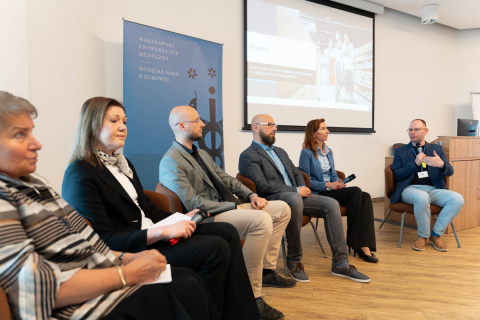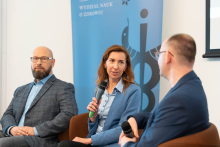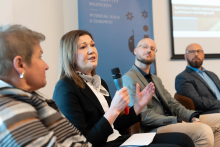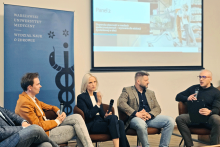The meeting was opened by Filip Raciborski, MD, PhD, Vice Dean for Public Health of the Faculty of Health Sciences MUW, who stressed that the topic of food labeling is of growing social and health importance.
Prof. Mariusz Panczyk then introduced the participants to the issue of nutrition labeling on the front of the package, presented examples of labels used around the world, and discussed the principles of the controversial Nutri-Score system.
Then it was time for expert discussions. The first panel with their participation was devoted to the scientific and marketing basis of the Nutri-Score. It considered, among other things, how much of this system is based on reliable data, and how much can be used as a tool to influence purchasing decisions. The second panel focused on the role that social media experts can play for nutrition education.
Panelists included: Baszar El-Helou (National Center for Nutrition Education), Dr. Hubert Dobrowolski (Academy of Economics and Humanities in Warsaw), Mariusz Jaworski, MD, PhD (MUW), Prof. Krystyna Gutkowska (SGGW), Małgorzata Twardzik, MD, PhD (SGH), Joanna Olszak (IGI Food Law), Dr. Damian Parol and Daniel Śliż, MD, PhD (Polish Society for Lifestyle Medicine) and Dr. Hanna Stolińska, clinical nutritionist.
Key conclusions
Experts in the debate stressed that labels such as the Nutri-Score, despite their readability, can be misleading if the system's criteria based on the latest scientific knowledge are not properly selected, there is no proper regulation and well-designed education.
They also noted the need for greater involvement of public institutions in overseeing the use of labeling systems and the need for a responsible presence of experts on social media as a counterweight to nutritional misinformation.
Health context and the need for intervention
In Poland, diseases of civilization, such as obesity, type 2 diabetes and cardiovascular disease, pose a serious health challenge. It is estimated that they are responsible for about 70% of deaths in the country*. The figures for children and adolescents are particularly alarming: as many as 25% of them struggle with overweight or obesity.**
In this context, food labeling systems, such as Nutri-Score, can be crucial for developing healthy eating habits. However, as experts stressed during the debate, Nutri-Score has many flaws and should not be used without prior validation by Polish public health institutions. This position is confirmed by the opinion of the Committee on Human Nutrition Science of the Polish Academy of Sciences, which in 2023 expressed critical comments against the Nutri-Score system.
Doubts around Nutri-Score
The Nutri-Score system was introduced in Poland by commercial entities and operates without a formal legal basis. Its algorithm does not take into account many important aspects of the nutritional value of products, which can lead to erroneous consumer choices. Research indicates that as many as 40% of Poles feel misled by Nutri-Score labels. ***
The experts agreed that public institutions, such as the Chief Sanitary Inspectorate (GIS), the Office of Competition and Consumer Protection (UOKiK) and the Ministry of Health, should urgently address the evaluation and regulation of the Nutri-Score system in the Polish market. Unfortunately, as noted during the discussion, to date none of these institutions has taken decisive action to stop misleading consumers and provide them with reliable nutritional information.
Objections to Nutri-Score - simplifying the message
- Nutri-Score is a simplification of the message that replaces real nutrition education - the consumer doesn't understand what the letter A or D means, and the colors and letters don't teach composition analysis. The system also allows manipulation - manufacturers can artificially improve the score by adding fiber, protein or reducing salt, with no real improvement in nutritional value. The rating for a 100 g/ml product does not reflect actual consumption - for example, a pizza rated “B” can be eaten in a larger portion, changing its health impact. The Nutri-Score also ignores the level of processing - ultra-processed products may have a high score, despite the presence of additives and preservatives. The WHO recognizes FOPL as an important communication tool, but independent validation, transparency of the EFSA-compliant algorithm and better alignment with Polish health realities are needed. The Nutri-Score system does not meet these requirements and should not be allowed on the Polish market - Professor Mariusz Panczyk concluded the debate.
________________________________________
* Source: “Diseases of civilization - cause of 70% of deaths in Poland”. – https://www.rynekzdrowia.pl/Polityka-zdrowotna/Choroby-cywilizacyjne-pr…;
** Source: “25% of children and adolescents in Poland are overweight or obese.” – https://www.rynekzdrowia.pl/Polityka-zdrowotna/Ekspertka-w-Polsce-25-pr…
*** Source: “40% of Poles feel misled by Nutri-Score” https://politykazdrowotna.com/artykul/nutri-score-pod-lupa-n1584301





